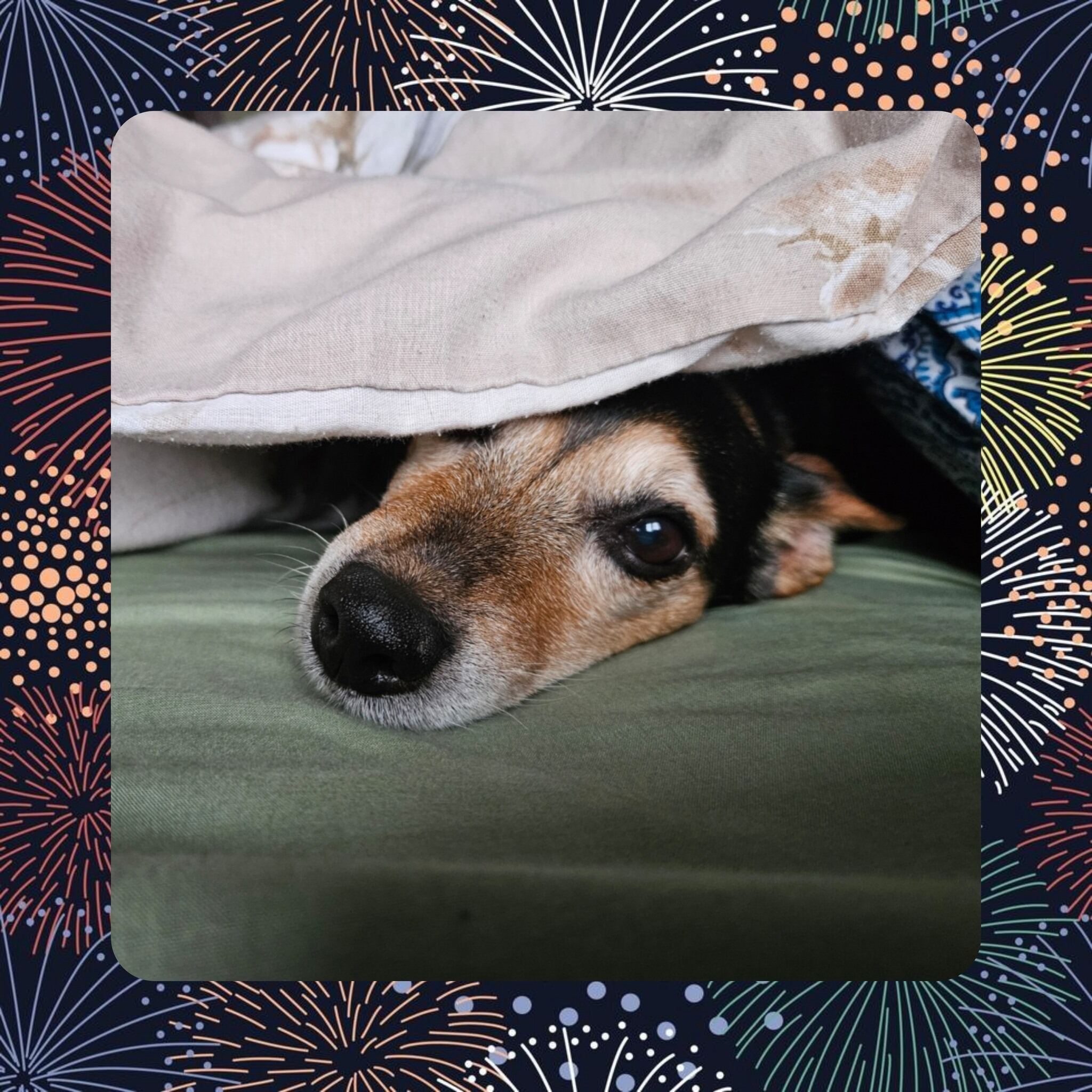Helping your Dog to cope with Fireworks

The bright flashes and loud bangs of fireworks might be exciting for humans, but can be really scary for dogs. This is because it’s difficult for them to understand that they aren’t in danger when they hear/see them, and their senses are much better than ours – so they experience fireworks much more intensely than we do!
Here are some top tips to help your dog cope with fireworks
Walk them whilst it’s still light before fireworks are likely to start. A longer walk with plenty of opportunity to sniff and explore will tire your dog and help them to relax, but remember to keep them safely on a lead in case an early firework frightens them and causes them to bolt.
Close your curtains before dark and leave the lights on to hide the flashes.
Play some music to help drown out fireworks noises. Classical can work well, or something with a deep bass to help cover up any bangs – just make sure it’s at a volume your dog is comfortable with (not too loud)! It’s worth starting this a few days/weeks ahead so your dog gets used to the music before fireworks night. There are some great playlists available on spotify and other music streaming services.
Stick to normal routines and behave normally but, if it helps, distract them with something fun such as a game, a puzzle feeder, or a toy stuffed with food.
Make them a den for them to hide in if they wish. This video from the PDSA will show you how – https://youtu.be/2MDaoW5i2WI
Comfort them if they come to you for reassurance – don’t ignore them, but if they want to be alone, let them (just keep a close eye on them).
Wait for a gap in the fireworks to take your dog out to the toilet, be as quick as possible and keep them on a lead at all times. Never let them out on their own during fireworks season – it’s common for dogs to bolt from their garden after being startled by a firework.
Keep them calm and relaxed with pheromones, which are chemical messages that dogs produce to communicate with each other, some of which help them feel calm. We can recommend suitable diffusers, sprays, collars and wipes that produce the same affects.
Use calming supplements and herbal remedies to help your dog relax. These work in a variety of ways, depending on their specific ingredients. Some supplements are more effective than others, and each dog responds differently, so if one type doesn’t suit your dog, you may find that a different brand works better. Please contact us for advice.
Try a compression shirt, which is a tight-fitting vest that provide a gentle calming pressure (similar to swaddling a baby) to help soothe anxiety. Only use a compression shirt if your dog is comfortable with it as it could cause further distress if they feel too restricted.
Never punish your dog for anything they do when they’re scared – this will just scare them more.
And Remember to check that your dog’s microchip details are up-to-date to give you a better chance of being reunited if they run away from home.
If your dog is still scared of fireworks despite all of these steps our vets may be able to prescribe some stronger medication to help. Please contact us to discuss this, and any of the above, to help keep your dog as calm as possible during firework season.
For further advice please visit Dogs and Fireworks – PDSA
How to make a Firework Den for your Dog
A cosy, safe den might help your dog feel safe and secure if they are frightened on fireworks night. Here are some tips on how to make one:
- Make it somewhere you know they go when they feel worried, such as behind the sofa, under a table, a crate, or inside a big, safe, empty cupboard.
- Make it a few weeks before fireworks season starts so they get used to it, and give them treats/praise when they go in so they think of it as a nice place.
- Make it as enclosed as possible by draping blankets.
- Make it comfortable with their bed or lots of cushions and blankets.
- Put some of their favourite toys and treats in it.
- Give them access to it at all times, but never force them into it or shut them inside it.
- Make sure they have a bowl of water very near to it.
- Don’t be disheartened if they don’t use it, or choose to hide somewhere else.
- Keep an eye on them when they’re in the den, but don’t disturb them – if they’re in it, it’s likely they want to be alone.
- Never force them out of the den even if they’ve been in it for a long time – just make sure they have access to food and water.
You may also like to watch this ‘how to’ video provided by the PDSA





